Anne H. Janzer's Blog, page 16
December 7, 2020
Books to Give Writers, 2020

2020 has been a strange year. Some of us need motivation, others need comfort and encouragement.
No matter what the people in your list need, I’ve got you covered.
Every year I do a round-up post of books I’ve reviewed or encountered in the year that would make wonderful gifts for writers. The list this year is sorted by the book’s “vibe”—encouragement or self-care. (Clearly many books do both, so take the division with a grain of salt.)
I hope you find ideas for the writers in your life, and possibly yourself.
You can find all of these books on Amazon. If you want to purchase or gift the physical books, head on over to this list on BookShop, which is an alternative to Amazon that benefits indie bookstores and publishers.
Books to Encourage Writers

Perhaps someone in your life needs a little motivation to do the writing or to know that they can make a difference. Perhaps that person is you. These books may help.
Some Day is Not a Day in the Week by Sam Horn.
If you know someone who has been putting off an important, life-changing project, send them to this lovely and inspiring book. Listen to my interview with the unstoppable Sam.
Writing to Change the World by Mary Pipher
From the author of Reviving Ophelia, this book has a journalistic slant, and would be great for the potential writer/activists in your life.
Write on, Sisters! by Brooke Warner.
Give this book to any women you know who want to write a memoir. Read my interview with Brooke here.
Championing Science by Amy and Roger Aines.
If there’s a scientist in your life, they have the double burden of contributing to science and effectively championing it to the world at large. Make sure that they have this book at hand. (Listen to my interview with Amy Aines.)
Purposeful: Are You a Manager or a Movement Starter ? by Jennifer Dulski
Although framed for a business audience, this book is chock full of lessons for anyone who wants to start something bigger than themselves. Listen to my interview with Jennifer here.
Get the Word Out: Write a Book That Makes a Difference by Anne Janzer
My latest book all about encouraging people to share their important thoughts with the world.
Ready to Be a Thought Leader? By Denise Brosseau
This is a classic; give it to anyone who wants to step into a thought leadership role in their industry. Listen to my interview with Denise here.
Brag Better by Meredith Fineman
This one is for the person in your life who is not willing to toot their own horn—perhaps you? Read my review here.
Self-Care for Writers (and all of us)

While some people have been writing like crazy, others have struggled in 2020, for many reasons. These books may provide the support and care that someone needs right now.
The Gifts of Imperfection by Brene Brown.
This book has been out for a while, but I only got around to it recently, at what turned out to be the perfect moment: while I was revising the manuscript for my latest book. It’s full of calming, anchoring wisdom.
Do Nothing by Celeste Headlee
If you’re feeling driven by your to-do lists and always deferring more meaningful moments, you may need to read this book. Headlee explores the different trends that have brought us where we are today, from the societal changes wrought by the Industrial Revolution to the blending of home and work lives. And she wraps up with six “life-backs” instead of Life Hacks, that bring it all home.
Bored and Brilliant by Manoush Zomorodi
When’s the last time you gave yourself permission to be bored? Boredom and creativity go hand-in-hand. Read my review here.
The Writer’s Process by Anne Janzer
There isn’t one correct way to write, but there are ways that you can make the process work well for you. Understanding them can be both validating and freeing.
Other book lists
Didn’t find the right gift inspiration above? Here are a few more lists to peruse.
My book Get the Word Out features a bunch of inspiring authors. Find a list of their books here.
The 2019 Gifts for Writers list. (You’ll notice some repeats with this year’s list.)
The post Books to Give Writers, 2020 appeared first on Anne Janzer.
November 27, 2020
Rethink the Bins: A Book Review

Why are there different recycling options in every city you visit? Where should you throw away that compostable plastic spork that came with the take-out meal? Why do you have to sort recyclables in one town and not another?
Recycling used to be one of the “simple things” you could do to save the earth. But lately it’s gotten more complicated.
In Rethink the Bins, Julia Goldstein writes with crystal clarity about a complicated, often murky subject—what happens to our waste and how we can take action to reduce it.

A Book That Makes a Difference
This is a writing blog, so why review a book about recycling? Because this book checks two boxes that particularly interest me:
Writing about complicated topics with clarityBooks with a strong sense of purpose
This book embodies both attributes.
First, it does a wonderful job of explaining the complexities of recycling and composting.
The sections of the book cover where household waste goes, recycling, composting, and waste streams. It answers those pesky questions at the start of this blog, and reveals many more fun facts along the way.
For example, I learned that food waste is a major source of methane from landfills, so composting your food scraps helps with greenhouse gases.
More importantly, this book motivates action. It’s an interactive workbook that you can use to manage your own household waste streams. The book offers several strategies for measuring your household waste so you can better control it.
The book is never or pedantic and always encouraging and human. As Julia writes, “Your efforts to reduce waste do matter. We don’t need a hundred families in the US achieving zero waste, We need millions of families in the US achieving more moderate waste reduction goals.”
After reading this book, I’ve become more aware of the waste, and feel more empowered to reduce my waste streams further.
Whether you’re writing a book hoping to make a difference in the world or simply interested in reducing your footprint, this book has lessons for you.
Find the book on Amazon or on Bookshop. Or order it directly from your favorite indie bookstore.
Notice: JavaScript is required for this content.
The post Rethink the Bins: A Book Review appeared first on Anne Janzer.
November 23, 2020
Writing Isn’t a Monologue
November 10, 2020
The Servant Authorship Mindset: Why It Matters

What motivates you to write, and how do you know when you’ve achieved success?
The world offers writers all kinds of proxies for success:
For book authors, sales numbers and best-selling labelsFor bloggers, the number of subscribers, amount of engagement, or reshares of postsOn social media, likes and follows boost our sense of success
These basic metrics are important to understand, but we often get caught up in them.
What if you measure success based on the what happens in the reader’s world, rather than yours? Instead of clicks or sales, you might look for:
The impact your writing has on someone’s personal life or the way an organization functionsThe behaviors or beliefs that shift in people who read your workThe person who shares your work with others they think will benefit from it, amplifying your impact
Sure, these things are harder to see and count. But aren’t they the real reasons you write?
How would a focus on these results change your approach to writing?
Servant authorship—let’s make it a thing
There’s a term in leadership circles: servant leadership. First coined in an essay by Robert Greenleaf in 1970, the phrase describes a style of leadership focused on “the growth and well-being” of the people being led and communities to which the leaders belong.
Wouldn’t you rather work for someone who embodied this leadership ideal?
We can apply that same philosophical bent to writing nonfiction books, blog posts, emails—anything that someone will read not purely for entertainment, but also for edification or growth.
Wouldn’t you rather read a book by someone motivated by a desire to serve you with what they know?
I can detect this approach to writing in many of my favorite authors. They are excited about sharing discoveries and do their best to make sure their words land with me in a way that makes an impression. They don’t focus on themselves as experts, but on me, as a valued reader.
Most writers are already motivated to serve
This concept isn’t foreign to most nonfiction authors. In fact, over 80 percent of the hundreds of nonfiction authors I surveyed chose “serving others” as one of their motivations, and 40 percent chose it as their primary motivation.
The motivation is already there, but might need nurturing. It’s easily swamped by all of those messages about “being a best-selling author” and writing that “fat business card” book.
While it sounds altruistic, a servant authorship mindset helps authors at every phase of a book project.
Planning: A sense of purpose gives you a guidepost for making tough decisions, like what to include and what to scrap. Drafting: When we focus on ourselves as we write, we may become self-conscious (if not overly self-absorbed). We write better when picturing our reader.Book marketing and promotion: This mindset supports you during the long phase of authorship that extends beyond publication day—everything you do to get the ideas out into the world.

Most of all, a servant authorship mindset keeps you going when the work is arduous or the end seems far away.
This is the subject of my latest book, Get the word Out: Write a Book that Makes a Difference. It looks at how to focus on your greater purpose and serving your readers at every phase of a book project, from formulating the initial idea to doing the work when the book is out in the world.
The value of servant authorship extends beyond writing books.
Nearly everything we write should, at some level, serve the reader, or else why will they care?
If we’re not serving others, we’re simply adding to the noise.
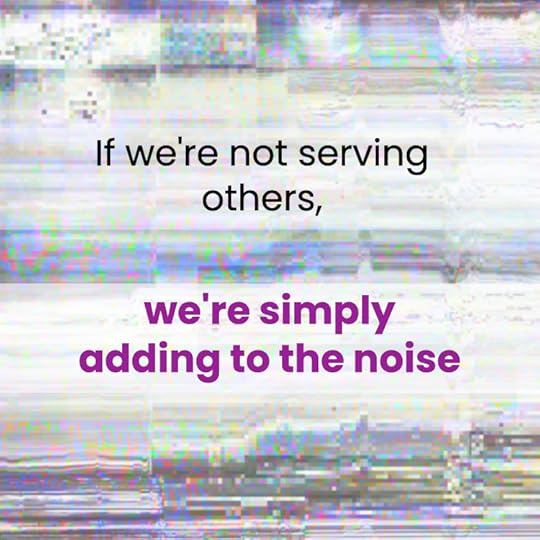
Dig deeper
The Nonfiction Author Survey, which covers the findings about people’s motivations for writing. Find survey results and a webinar here.
Find the book Get the Word Out: Write a Book That Makes a Difference. (It’s on sale through the book launch.)
The post The Servant Authorship Mindset: Why It Matters appeared first on Anne Janzer.
October 27, 2020
Why Your Purpose Matters

What’s the purpose for your writing?
Have you thought about it lately, or are you stuck in the daily demands of hitting deadlines and building readership? It’s easy to lose sight of a long-term goal when you’re swamped in details.
Take a moment to think about your broader purpose for writing. What impact do you hope to make?
Join the Pack of Purposeful Writers
This past summer, I conducted a survey of nonfiction authors. Two survey questions asked about people’s motivations for writing their books.
People could choose from the following objectives:
Personal goal: I’ve always wanted to write a bookBusiness goal: I want to build my businessCareer goal: I want to make myself more marketablePurpose: I want to serve others with what I knowFame and fortune: I’d like to be a best-selling authorPersonal fulfillment: I really want to share this story/ideaOther
Which answer do you think was the most common? The one about purpose: serving others.
More than three-quarters (about 80 percent) chose “Purpose: I want to serve others with what I know” as one of their motivations
Nearly 40 percent chose that purpose as their primary motivation.
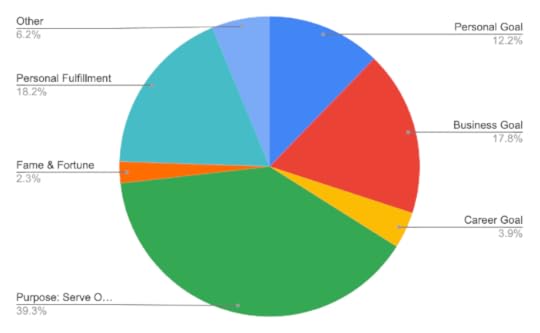
In contrast, only 2.3 percent focused primarily on the desire to be a best-selling author. That’s good news—fame and fortune are hard to come by in the world of writing books.
Keep in mind that almost half (200) of the author had written business or career advice books. Yet only about 20 percent of the authors reported business or career objectives as their primary motivations.
Are you surprised?
We see so many pitches to “write a fat business card.” Yet, that’s not the motivation that seems to drive the authors I surveyed.
A Sense of Purpose is a Powerful Motivator
This may be a case of survivorship bias in the data. In other words, those people who start with purely self-serving motives may be less likely to make it through the gauntlet of writing and publishing a book. So, we end up with authors driven by a sense of purpose.
Having a larger purpose adds clarity to the writing itself, as you focus on the needs of your audience
It keeps you going through the process of drafting the manuscript.

A sense of purpose also makes you more resilient during the long post-publication stage, as you support the book in the world and encounter the inevitable detractors.
Here’s the good news: Nearly anyone can get the benefits of a purpose-driven focus simply by contemplating the reader’s needs. And understanding your reader’s needs improves your writing. It’s a double win.
Choose Your Writing Motivations
Make a list of all the reasons you want to write this thing you’re writing, whether it’s a blog post or a book.
It’s fine to have self-serving objectives like building blog readership, attracting new clients, or perhaps fulfilling a lifelong dream of being an author.
Can you find other motives based on your readers or the world at large?
You probably already have an other-focused purpose on your list: many writers do, And if you don’t, try adding one.
Once you have it, keep that purpose front and center. Remind yourself. Post something on your wall or your monitor. Write in your journal about it. Keep returning to your purpose.
Serving others just might help you achieve your other objectives.
Want to dive deeper?
Find the survey results (including webinar replay) here.
You’ll find much more about using purpose in your writing in my upcoming book Get the Word Out: Write a Book that Makes a Difference (releasing November 10, 2020).
The post Why Your Purpose Matters appeared first on Anne Janzer.
October 13, 2020
Finding a Writing Voice That Fits

Many writers struggle to find their “authentic” writing voice. It’s a challenge: How do you write in a way that seems natural and authentic while serving your purpose?
Authenticity is important, but in searching for a single, authentic writing voice, people can tie themselves up into knots. That pressure makes it harder to find their voice.
A writing voice is like a pair of shoes; you need more than one.
You need options for different occasions: sturdy hiking shoes for rough terrain, dress shoes for formal occasions, and your favorite comfy shoes to wear doing errands.
Likewise, you need to align the words you use and the way you put them together with the occasion. Create a “voice” that resonates with your audience, matching both their needs and your personality.
Does the Shoe Fit?

If you write in your professional life, you’ve probably developed habits based on how people in your industry write and speak.
Academics, for example, tend to write for their colleagues and students, using plenty of abstractions and research citations. The resulting voice is expert, careful, measured, and professorial. That style doesn’t work well when you are trying to reach people outside the academic environment.
Perhaps you always write exactly as you speak. That’s great if you want a conversational style—and it plays very well on social media posts. However, informal speech patterns and phrasing, interpreted literally, can work against you in the business environment. (Right? I’m not gonna lie, but … Whatever.)
Being too “casual” can undermine your authority in a professional setting.
In both cases, these writing styles fit you, but not necessarily the audience. That’s why it helps to get comfortable with multiple voices.
Try On Another Pair of Shoes

Consider the way that you speak. You automatically adopt a different tone and style of speaking based on the situation: explaining something to a two-year-old, having a conversation about salary with your employer, or chatting with friends. You automatically choose the right “tone of voice” and style of conversation based on the setting, but each of those voices is authentic.
You can cultivate and activate writing voices In the same way—by focusing on the needs of the audience. Tinker with your tone and style by picturing a different audience than your usual one.
For example, if you’re an academic type and want to write for a business reader who is pressed for time, search your friends and colleagues for someone who fits that role, and picture them in a hurry on the way to work. How would you catch and hold their attention for a few minutes with your topic?
If you’re trying to make your blogs or emails more lively, envision a smart high school student with only a vague interest in your topic as you write. How would you communicate your idea to them?
If possible, picture someone real that you actually like. That personal warmth often shows up subtly in the tone.
If you cannot hold the image of the audience in your head while writing, try using dictation software to record yourself speaking to them. See what comes up.
How Does Your Writing Change?
When you do this, notice what’s different about the way you write for this other audience.
Does your vocabulary shift? Are your sentences shorter? Longer?What about paragraph length? Does that change?Do you search out analogies or metaphors to earn attention?
Once you see the changes that happen, you’ve got something to work with going forward when switching between styles.
Spend some time writing in this new perspective and see if you can find a comfortable, yet authentic, writing voice for this situation. Use it enough and, like that pair of shoes, it’s likely to get more and more comfortable.
More Like This
Find advice on tone and style in Writing to Be Understood
Read the blog post How to Talk about Tone, Style, and Voice in Writing
The post Finding a Writing Voice That Fits appeared first on Anne Janzer.
October 8, 2020
Nonfiction Author Experiences
Writing a book can feel like a solitary activity. Much of the time, you’re slogging on your own, or deep in your own head. So it’s fascinating to have insight into other people’s experiences.
As it turns out, we have a lot in common.
Despite the differences in individuals and subject matter, common themes emerge.
We often struggle to find the time and motivation to write. We’re confused about our publishing options. The amount of effort involved in marketing and promoting the book takes us by surprise.
Despite all that, the act of putting a book out into the world usually meets or exceeds our expectations. It’s worth it.
I know this because I asked.
The Nonfiction Author Survey Results Are In…
This past summer, I asked both published and prospective nonfiction authors to complete a short survey about what motivated them to write a book and what their experiences were.
More than 400 people responded, answering questions about topics including their reason to writing, their publishing path, and whether the result met their expectations.
Unpublished authors reported where, if anywhere, they were getting stuck in the process. (Time and motivation are the biggest issues.)
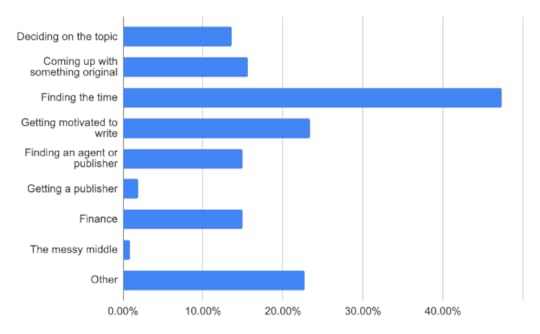 Answer to the question about where people got stuck
Answer to the question about where people got stuckPublished authors responded to a question about their biggest surprise. Here’s a word cloud illustrating some of that advice:
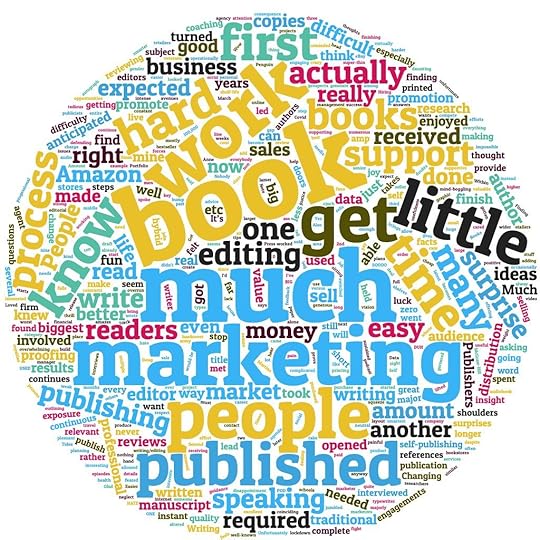
The survey has contributed to a few blogs already:
It also appears in my upcoming book Get the Word Out.
Want to Know More?
Short version: See a highlight of the results on this page. There’s also a link here to download the entire report.
A deeper dive: Join my webinar on the survey, Friday October 23. Register here.
The post Nonfiction Author Experiences appeared first on Anne Janzer.
September 15, 2020
Research or Procrastination?

I’m a big fan of doing research. But I’m such a fan that I’m tempted to get stuck in the research phase. It’s fun. It’s fascinating. And it’s a reason to put off writing—especially writing something major, like a book.
Are you researching or procrastinating?
If you’re working on a doctoral dissertation based on academic research, then you probably have to finish the research before you start writing. For the rest of us, the boundaries between research and writing are often porous.
Writing a Book Is Not a Linear Process
You might think that the process of writing a nonfiction book is pretty simple: you do all of your research, then you write:
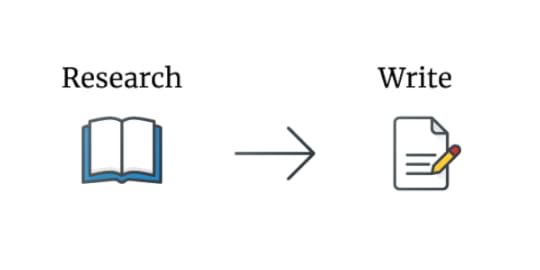
But for most nonfiction authors, reality looks something more like this:
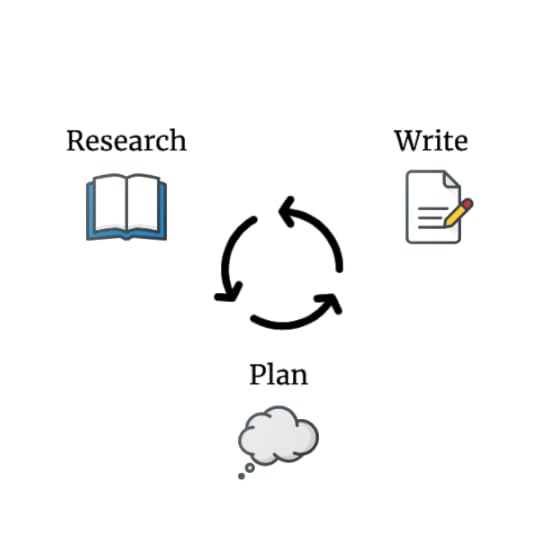
If you don’t believe me, look at the data from my Nonfiction Author’s Survey. Hundreds of nonfiction authors responded to this online survey: these are the type of people who typically do a lot of research.
These are their responses to a simple question: did they finish their research before writing?
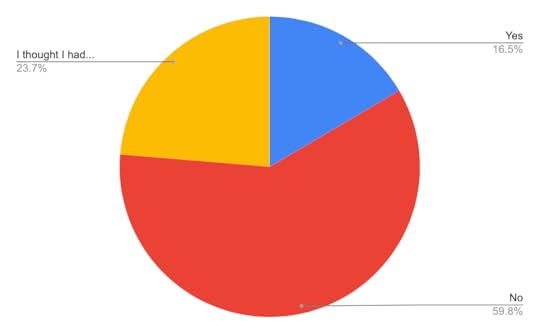
The smallest wedge (16.5%) of this pie chart represents the authors who researched first, then wrote.
More than 60% started writing while still conducting research. And nearly a quarter thought they had finished, only to return to the research after starting to write.
Here’s some advice: don’t try to finish the research entirely before drafting, because the act of writing may open up new areas to explore. Start working with that research!
Related Posts
The Five Phases of Book Research
How Much Research Should You Do?
Notice: JavaScript is required for this content.
The post Research or Procrastination? appeared first on Anne Janzer.
September 1, 2020
The Truth about Outlines

It’s been drummed into your head since grade school: outline before you write. This is excellent advice. Outlines make you think clearly before you write, and keep you on track for longer projects.
If you pitch a nonfiction book to an editor, your proposal includes a detailed outline. The editor decides to buy the book or not on the basis of that proposal. So, you might think that the outline is set at this point.
Here’s the secret: Most published nonfiction books don’t match the outlines that the authors proposed.
Books tend to outgrow their outlines as we write.
Are You Part of the 6 Percent?
I recently conducted a survey of over 400 nonfiction authors, both published and not-yet published. Of those with published books, about half had worked with traditional publishers, which meant they had submitted a book proposal with an outline.
Do you know how many authors ended up with a book that matched their outline? Less than six percent!
The rest of us make adjustments. As we write, better approaches reveal themselves. In the survey:
More than half (56%) made minor changesMore than a third (34 percent) had major deviationsThree percent ditched the original outline completely
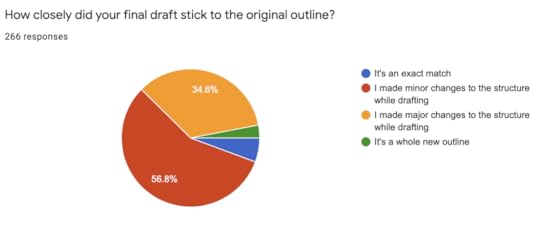
Outline, Then Grow
Outlines serve many purposes: they keep us on task, help us scope the work, and make us think critically about the thing we’re writing.
But often the thing we write outgrows the outline. You realize partway through this part would be better over there, or maybe the reader would rather encounter this bit first. (See my post on Outgrowing Your Outline.)
Maybe you’re one of the six percent who gets it exactly right when you outline. But don’t count on it. Don’t be afraid to adjust the outline to make the final work better.
You Might Also Like:
Leaving Room for the Unexpected
Notice: JavaScript is required for this content.
The post The Truth about Outlines appeared first on Anne Janzer.
August 18, 2020
Join Your Chorus

Individually, the impact you or I can make in the world is limited. But as part of a larger group, we can amplify and augment each other.
If you want to have an impact in the world, pay attention to the choruses you join.
You can’t create change alone
As a classically trained singer, I enjoy both solo and symphonic choral work (back when choruses were rehearsing and performing together.) The lessons of singing apply pretty well to the rest of my life.
Choral singers blend their voices with others in their sections. You cannot measure the difference your voice makes to your section, especially in a larger group. But you know in your heart that you contribute.
In a chorus, you become part of something greater than the sum of its parts. When everyone is singing in perfect tune, the resonances expand and the sound carries in a different way. You can feel it.
The same thing is often true of writing.
You write, not seeing the impact you have, but in faith that it does matter. You may worry that your idea isn’t original, that you have nothing new to contribute to the conversation. Yet there is still value in chipping in, in adding your voice to those of others who write about similar things.
How do you contribute to the chorus?
There are many ways that you can support the ideas you value through writing. For example:
Amplify the voices of others by re-sharing their posts or curating collections of posts and articles.Add your thoughts and perspectives to others’ works in comments, commentary, or reviews.Contribute your own perspective. Even if others share it, your story or slant may bring something new.
Take the solo when it’s available
Many choral works have soloists, who must carry over the instruments and chorus. Even as a soloist, you’re part of something larger.
Don’t hesitate to step up and share your thoughts. Yours might be the contribution that lands with a reader who hasn’t tuned in. Yours might be the voice that gives resonance to a larger idea.
Maybe that’s how your voice will have the greatest impact: sometimes on its own, sometimes as a strong leader of your section. That’s a fine contribution to the world.
We applaud the soloists, but we need the chorus.
You might also like…
Finding Purpose through Writing
Notice: JavaScript is required for this content.
The post Join Your Chorus appeared first on Anne Janzer.




